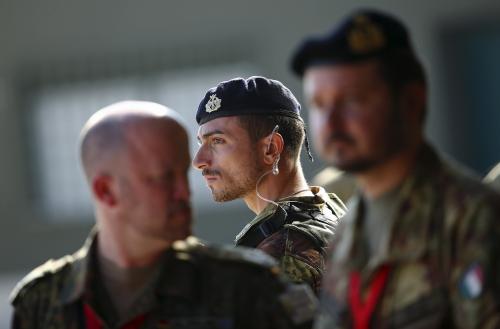

11:30 am EDT - 12:30 pm EDT
Past Event
On May 7, the Foreign Policy program at Brookings hosted Admiral Charles Richard, commander of U.S. Strategic Command, for a conversation with Senior Fellow Michael O’Hanlon on strategic nuclear deterrence.
Adm. Richard began by laying the foundation for how U.S. Strategic Command (STRATCOM) thinks about strategic deterrence, which is the number one mission in the Department of Defense (DOD) and can be traced back 70 years. But thinking about effective strategic deterrence must encompass all domains, including nuclear, conventional, cyber, and space. Adm. Richard stressed that strategic deterrence should not be thought about in pieces; it’s all linked and to be most effective, STRATCOM works closely with the ten other combatant commands to address the series of complex challenges facing the United States each day.
A central challenge, Adm. Richard explained, is how U.S. strategy evolves as the world changes. In the past, deterrence has focused on a single competitor. Now, the threat is two simultaneous, yet strategically different competitors. “Never before as a nation has the U.S. had to deter a two-peer nuclear-capable competitor at the same time…this is a very different set of dynamics, particularly because they have to be deterred differently.”
O’Hanlon asked Adm. Richards about arms control goals and how STRATCOM can get U.S.-Russia and U.S.-China relations on a trajectory where arms control becomes meaningful and possible again. While the ultimate goal would be a world without nuclear weapons, Adm. Richard stated that anything the U.S. can do to help lower the threat helps, such as expanding agreements that limit non-treaty accountable weapons. Transparency and communication are also vital to bringing down the threat level. “The U.S. and Russia talked all the way through the Cold War and there was great value in that,” he said.
O’Hanlon then asked Adm. Richard to explain why he prefers a nuclear triad – which is made up of primary long-range nuclear delivery capabilities: the intercontinental ballistic missile (ICMB) force; the governing base missile force; and bombers — to a dyad weapon structure as means of nuclear deterrence. STRATCOM, unlike the other combatant commands, does not have the ability to set its own objectives to execute strategy. Therefore, having a triad allows a degree of flexibility to achieve presidential objectives. If one leg of the triad is removed, it is not automatically absorbed in another leg; a triad allows total capacity to achieve the mission.
Concerning the intricacies of the command-and-control structure, Adm. Richard noted that he has “fabulous confidence” in it and explained that all U.S. weapons are under positive control and will do exactly what the president says. One important consideration, however, is “whatever system we come up with, it has to be very clear to the military who has the authority and who has the responsibility to give that order.” O’Hanlon then asked specifically about STRATCOM’s capacity to deter cyberattacks on U.S. nuclear weapons. Highlighting the achievements of U.S. Cyber Command and the National Security Agency, Adm. Richard explained that the establishment of an NC3 Enterprise Center helps oversee all of DOD’s nuclear command and control operations. A system like this one, diverse and opening in relative isolation, has advantages that add to the security of nuclear command and control.
However, the systems do need to be modernized. Recognizing that some were implemented before Internet or before cyber was defined, Adm. Richard compared modernization to “trying to put an automotive engine control computer on a ’73 Chevelle.” But because modernization is something that is done only every 40 years, the conversation should be situated in the broader context of overall national spending and what level of risk the country is willing to shoulder, he explained. But, he concluded, “I’m confident our leaders both inside the Department and inside the nation will make wise decisions.”
Moderator


Jonathan Katz, Lily Conway, Norman Eisen, Robin J. Lewis, Andrii Borovyk, Josh Rudolph
April 19, 2024

Michael E. O’Hanlon
February 15, 2024
2024
Online Only
2:00 pm - 3:00 pm EST